Part 3
As Rose and I finished our dispiriting walk, we passed a green sign with white lettering announcing there was to be “NO LOITERING” thereabouts. “Well, well, well,”I thought, “who’d spend a second longer here than strictly necessary? You’d have to be off your head.”
Strangely enough, it was posted just outside the Aberdeen Timberland Public Library which was the best-looking building anywhere to be seen. It was shut at that hour (that figures), but to me it was a vision of excellence, a glimpse of a glorious plane of existence— far from the grit and grunge of downtown Aberdeen.
I adore libraries in general, and heartily agree with Argentine writer Jorge Luis Borges (1899-1986) who wrote, “I have always imagined that paradise must be like some kind of library.” It sounds quite musical in Spanish: “Yo, que me figuraba el Paraiso bajo la especie de una biblioteca.”
I’ve tried to analyze my love of libraries; it’s rather like asking yourself why you love the “love of your life.” I believe I can say something that hints at it. A fine library is a repository of the very best in intellectual and spiritual attainment—literally everything you want to know— the sum of all human knowledge, and much divine.
When I’m in a good library I feel an exhilaration, a giddy intoxication, being in the presence of all those books— all that power of mind and heart— one is awash in learning, swimming in it. I look around to see which ones I’ve read. When I see one, it’s like recognizing an old friend in a crowd of strangers. My heart leaps up.
Moreover,I feel a strange kinship with other library browsers whom I believe have a similar love of learning. In a sense, the library not only contains all the thoughts within its books, but in a mysterious way, the very walls of the place absorb the thoughts of its browsers, too. You can almost hear their minds sizzling as they prowl the stacks— treasure-hunters— sampling this book and that.
Before I leave this dear subject, please allow me a word on a major peeve of mine— speaking aloud in libraries. When I was young, the need for silence in the library was understood. Good books deserve reverence, peace and quiet— and readers need to concentrate, don’t they?
In those days, flouters of the golden-silence rule were met with an imperious “ Shhhhhhhhh!”— and a frown from the librarian—pale skin, hair in a bun, leashed spectacles low on her hawk-nose. The library is where we kids learned to whisper. It’s a lost art, and that’s a great pity.
Today, of course, there is no impediment to speaking loudly in the library. People talk in the library like they’re bellowing to their neighbor across the fence, over the roar of lawn mowers. I occasionally ask library yakkers to ‘tone it down’; they are always irritated but usually comply, however briefly. I may try to refine my technique; perhaps an emphatic “Shhhhhhhhh” and a frown
might work.
As I mentioned, the anti-loitering sign outside the library attracted my attention. Before we leave Aberdeen,I’d like to briefly consider the concept of loitering. What an awful word; it almost rhymes with toileting. It reminds me of a heap of soiled toilet paper in the street.
In any case, it’s defined as “the act of lingering in a public place with no apparent purpose.” The word comes from ”Middle Dutch” meaning to “wag about.” No kidding.
There have been laws concerning loitering for centuries. The authorities at various times enacted them to discourage certain social ills associated with hanging about on the street— prostitution, drunkenness, drug dealing and the like. My father used to call idlers of this sort “drugstore cowboys”.
I don’t know, but it seems to me that forbidding troublemakers to loiter outside the library might prompt them to come on in and make themselves at home—and not for reasons associated with learning. I think the sign creates the risk of turning a precious and refined place into a den of thieves and cutthroats. Perish the thought! Then there’d be more to worry about than loud-talkers.
Before moving on from this benighted city, I thought I’d look up local crime statistics. The bottom line is this: out of a possible score of 100 for the safest city in America (Wayland, Mass.), Aberdeen comes in at a mighty six. In other words, 94% of American cities have a lower crime rate than Aberdeen. Need I say more?
So, shaking the dust of Aberdeen from our feet, Rose and I continued our journey westward three miles, until we arrived in a little town with the puzzling name of Hoquiam. Naturally, it comes from the native Quinault language, and it means “hungry for wood”. Make of that what you will. It’s the only Hoquiam in the world.
We were headed for the coast and I planned to roll right through the place. But, as usual, something caught my eye.It was, in fact, an example of something that has always greatly charmed me— a bookmobile. It was parked just off Emerson Street, down the street from Al’s Humdinger Diner.
I was beginning to think that this was a very literate part of the country. I have been aware of bookmobiles most of my life, and it seems a wonderful thing, delivering learning and entertainment to people who have neither transportation nor books of their own.
I jumped out of the rig and ran back to take a photo. On the side of this ‘70s era white van was printed “Hoquiam High School Book Mobile”, also “Books R’ Fun” and “Read 4 Fun.” I wondered if the High School teachers themselves approved of taking such liberties with abbreviations. My guess is that they are a fun bunch, and are all for it. I would point out, however, that “bookmobile” is properly written as a single word, not two. For the record, bookmobile is a “compound” word. Just so we’re clear.
As I was taking photos, two grandmotherly types walking by decided I looked as though I might need a little guidance. “You like bookmobiles?” one asked.
“Sure,”I said, smiling, “I love ‘em. Love books… bookmobiles…I’m all in favor of disseminating knowledge.” I watched their reaction; I fancied they might be retired teachers themselves. I was trying to get a rise out of them.
Without missing a beat, the other said, “We love our Hoquiam bookmobile very much, but they stopped the service last summer because of Covid. But they say it’ll start up again in the spring — depending on Covid, of course.”
We chatted a bit longer, and then we bid one other a warm farewell. Our exchange made me happy; they seemed to me to be wonderful human beings, intelligent and hospitable. This interaction with the local ladies got me wondering about the history of the bookmobile, so I did a little digging, which
leads us to our next brief digression.
What we call the bookmobile has been known by many names throughout history: traveling library, library wagon, book wagon, book truck, library-on-wheels, book auto service, and likely others.
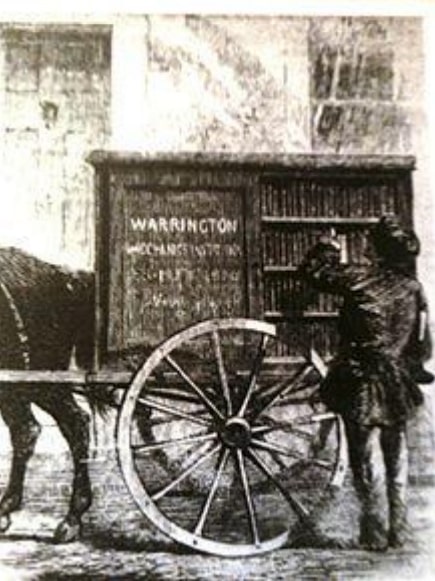
An early English embodiment of this idea was The Perambulating Library seen in the streets of Warrington, Cheshire, in the mid-19th century. I just love this picture; I’m not sure if it’s a drawing or a daguerreotype. What’s that fellow looking for? I’m guessing David Copperfield—but he’s just discovered it’s out on loan.
The heyday of the bookmobile was in the 20th century. In WWII, for instance, many London libraries had been bombed out of existence. In response, certain districts converted old vans into “mobile libraries”. They were very popular and a great morale-boosters for the civilian population. In my mind’s eye, I see a red, white and blue banner on the side of a wartime mobile library: “Keep Calm— and Read On!”
The mobile library of the London borough of St.Pancras was a marvel: it carried 2,000 volumes and could accommodate twenty browsers at a time. As the mayor commissioned this rig, he noted, “People without books are like houses without windows.”
I can imagine borrowing, say, Eric Ambler’s 1938 thriller Cause for Alarm from the St.Pancras mobile library. I’d tuck it carefully into my coat pocket with a view to pulling it out when sheltering in the Tube during the next air-raid. Doubly-thrilling, I’d say. I’d also say that if London plucked up the courage to keep mobile libraries operating during the Blitz, Hoquiam should have been able to continue its Book Mobile service during the Pandemic.
In America, the advent of the bookmobile was in 1904, a service of the People’s Free Library of Chester County, South Carolina. It was a mule-drawn wagon that made its rural rounds with wooden boxes of books. In 1922 the Hennepin County Public Library in Minneapolis started operating a horse-drawn book wagon. Later, during the Great Depression, an initiative of the New Deal gave rise to the Pack Horse Library Project which distributed books in remote parts of Appalachia.
It may interest you to know that acclaimed novelist Stephen King credits a bookmobile experience at age 12 for spurring his writing career. In 1963 he was in a bookmobile in rural Scarborough, Maine and asked the kindly librarian what he should read to learn what children are really like. She recommended Willian Golding’s classic Lord of the Flies—an electrifying study of the dark side of human nature. The book invaded King’s heart, soul, and mind— affecting his writing to this very day.
Mobile book-loaning is international in scope, as you might expect. In various places use is made of donkeys, camels, trains, boats and elephants. I wish I had more space to deal with this subject; it is very rich indeed. However, before we move on, I’ll note that the Elephant Library of Northern Thailand was awarded the UNESCO International Literary Prize for 2002. What could be better than that?
To continue with our journey…over the next few days we made our way to the north of Gray’s Harbor and hit the coast road (WA109) at Ocean Shores. The weather had turned very rainy and windy and I was starting to wonder if I would have been smarter to choose somewhere else to spend two weeks.
Before I left home Cynthia had warned me about an “Atmospheric River” that was approaching this area. We’d had one a few weeks previously in British Columbia, and it was a true catastrophe– towns flooded, roads and bridges washed away, animals drowned, highway fatalities and so on. I had the distinct feeling I had better hurry up and pick a good spot to hunker down and brace for the deluge.
As I searched for a place to land, it struck me that the place names hereabouts are awfully unimaginative. Why, you’ve got Long Beach, Seaview, Ocean Park, Bay Center, Grayland Beach, Ocean Shores, Ocean City, and various other watery labels. Toward the dead-end of this coastal road I found a place with the dullest name of all— Pacific Beach. Seriously!
But never mind the name—at that moment I needed some high ground, an electrical connection and bulletproof Wi-Fi. I was glad to learn that the main feature of this tiny place is Pacific Beach State Park, which has a fine campground, including RV sites, endless beach and, I’m told, yurts in season. In any case it had everything I needed and was to be my refuge for the next four days. Pacific Beach has a distinctly edge-of-the-universe feel to it.
I took Site 6. My neighbor, who had a brand-new rig twice as long as mine, was trying to deal with his awning in the stiff wind and rain. It wouldn’t retract, and he had the whole thing jury-rigged to nearby boulders and picnic tables with miles of rope to keep it from tearing loose. “Need some help?” I asked cheerily. “I’ve got tools.”
He took one look at my rig and me and gruffly replied, “No, I’m good.” It seemed like it was beneath his dignity to accept my help. By comparison, almost all the RVers I’ve met are models of chatty pleasantness, full of intel, eager to help or be helped. Never mind, I wouldn’t trade my rig for two of his— he must have been a novice. My bet is that he’ll put his rig up for sale next spring.
Meanwhile the weather was worsening; the westerly wind gradually rose to gale-force. I had to back the rig into my site, so that the right side was windward, toward the sea. The wind tore the tops off the whitecaps and howled among the rigs. There was much metallic rattling; anything that wasn’t pinned down went sailing.
The rain, which had been falling vertically, started to angle in, till it lashed the right side of the rig horizontally. In any case, I soon got the rig situated properly—plugged in, lights and heat on, supper on the stove, dog fed—snug as anything. Or so it appeared at the time.
We stayed there 4 days and it poured and blew the whole time. We wallowed in the atmospheric river. I had recently resealed the roof, and never was there a more rigorous test of water-tightness. Bright Hope passed the test brilliantly. But this rain was not to be outwitted.
The prevailing vector of this endless storm seemed narrowly aimed at the window next to my bed. I don’t know how it happened, but on the second night a gasket must have washed away, and water started to collect on the window ledge. Before I realized what was happening, I found that about a third of my bedding was either damp and soaking.
For the rest of my stay there I stemmed the flow with a towel on the window sill; I had to wring it out every hour, day and night. In one of my fitful naps I dreamed I was on a disabled submarine at the bottom of the Mariana Trench. The hull was groaning, the rivets popping, water gushing in… I awoke in a cold sweat.
The rain put me in mind of a Ray Bradbury short story from 1951 called The Long Rain, which takes place on Venus, a planet where, he supposed, it rained all the time.
Here’s how to story starts:
The rain continued. It was a hard rain, a perpetual rain, a sweating and steaming rain; it was a mizzle, a downpour, a fountain, a whipping at the eyes, an undertow at the ankles; it was a rain to drown all rains and the memory of rains. It shrank men’s hands into the hands of wrinkled apes; it rained a solid glassy rain, and it never stopped.
Isn’t that wonderfully descriptive? I’ll never think of Pacific Beach without remembering that story, and the surpassing misery of ceaseless rain. Rose and I made grim but imperative forays onto the beach every few hours—into the miserable wind, rain and darkness. It was fun at first, but after a while the situation became mighty tiresome. The rig gradually accumulated sand, and became very humid because of our breathing, cooking and damp clothes, bedding and towels. Rose’s belly fur was constantly wet and sandy.
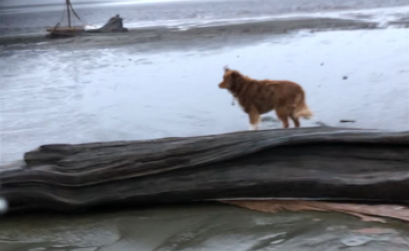
Now I’d like to comment briefly on rain gear— in these parts we are world experts on the subject. If you come here in winter you need to examine every piece of your gear: umbrella, hat, coat, pants, boots and gloves. You’ll find that proper protection will be rather expensive, but you must realize that your choice is stark— would you rather be frugal or comfortable? It’s your call. Remember Ben Franklin’s sturdy dictum, “The bitterness of poor quality remains long after the sweetness of low price is forgotten.”
You may immediately reject any clothing labeled ‘water-repellant’; you surely need ‘water-proof’. Waterproofness, believe it or not, is relative— rated on a scale from zero to 10,000 mm. For a summary, see: Mountain Warehouse Waterproof Jacket Guide
Basically, you should buy the best you can afford. I insist that hat, coat, pants and gloves be essentially made of rubber, with sealed seams. It’s also important that the garment be able to ‘breathe’, and that there’s a layer of fabric to keep sweat (which is acidic) from direct contact with the rubber. I’ve been a Helly-Hansen man for 40 years, and no fooling about it. It’s such fun being cozy in a deluge.
After two days of this masochism— to add a little variety— we walked out of the campground to the center of the village, a quarter-mile away. The most prominent structure there is a building with an oversize yellow storefront with “Wacky Warehouse” scrawled upon it. This was clearly a place to investigate. I ducked in.
It’s a place full of odds and ends of all types— clothing, tools, books, records, vinyl, 8-tracks, VHS tapes…all manner of nearly worthless junk. I couldn’t see a single thing I wanted. Moreover, they had a few brainless slogans on the wall concerning Covid, ‘medical freedom’ and so on. There was a picture on the wall of Dr. Fauci—depicted as a devil with a stack of masks on. My hackles shot up.
Nevertheless, there was an aspect of the place that was intriguing, indeed endearing. A corner of the store was occupied by a functioning radio station, namely KXPB, 89.1 FM. My eyebrows shot up when I learned that it operates all the time— “24/7/365”. Their slogan is “Your Host on the Coast”. You’ve gotta love that.
They say the range of their transmitter is ten miles on a good day, but if I’m any judge, it’s a terrific station: not much talk, no advertising, and the most stimulating, eclectic selection of music I’ve ever heard—one unpredictable pick after another. Think: Two Out of Three Ain’t Bad by Meat Loaf— followed by Chattanooga Choo-Choo by the Glenn Miller Orchestra— followed by all four movements of Scheherazade by the Vienna Philharmonic Orchestra.
It makes you breathless to contemplate! Any sane person would have developed musical indigestion, but I loved it. It was great company at all hours, as I muddled through the deluge.
KXPB started as a pirate radio station in the nineties. And wouldn’t you know it?—the FCC shut it down. But all was not lost; since 2004 it’s been going full bore, and proud of it. You’d have to hear it to believe it.
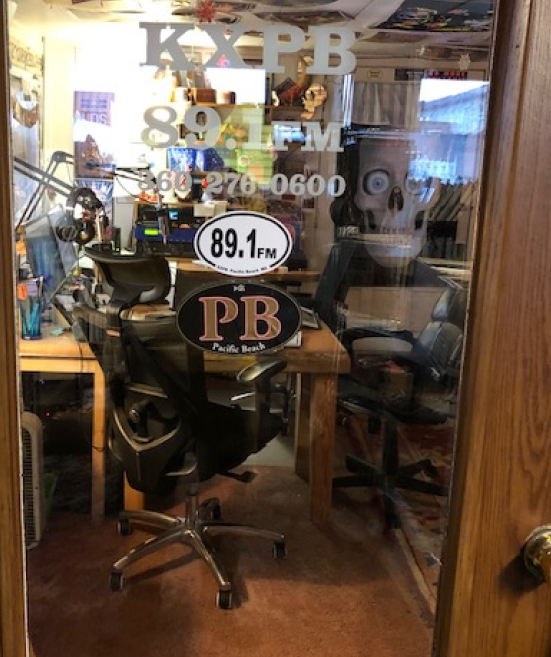
On my second visit to the Wacky’s I met the founder, a man named James. Early in our conversation I found he was pushing me to disclose what I thought about all the Covid political stuff. I saw the Fauci picture over his shoulder. He started to mount his anti-vax hobbyhorse. After perhaps five seconds I cut him off and told him I’m a physician, and I didn’t care to discuss medical matters at that moment. I have grown very weary of amateurs giving me medical advice.
We veered off in another controversial direction: religion. I don’t remember why, but he told me his grandfather used to be President of the Missouri Synod of the Lutheran Church of America. I asked James if he practiced a particular faith, and he frowned. After a moment, he replied, “Yes, I do believe in the teachings of Jesus Christ, but I don’t like organized religion. I don’t go to church.” He looked at the floor.
Later in our conversation I asked him what effect his faith had on his life. He smiled slowly, and said, “Well, I run the local food bank. How’s that?” He looked me straight in the eye. I thought it was a fine answer, and a fondness for this odd man sprang up in my heart.
I could have argued Covid with him, but it would have been futile, and each of us would have gone away mad, thinking the other was a moron. As it was, we parted on a friendly note. As I was leaving, he asked me rather shyly if I cared to buy a KXPB souvenir tee shirt. And I did; it’s truly hideous– but good for sleeping in, and it makes a decent souvenir of what we might call The Great Pacific Beach Atmospheric River of 2021. And I wouldn’t want to forget that.
I’d love to go back there when it wasn’t raining and find out the local news—what tunes he’s playing, if he’s over Pandemic politics, and how the food bank is going.
Well, my friend, it’s nearly time to wind up this account of my off-season ramble in a deep and dark Washington November. I thought of Ishmael, the protagonist in Moby Dick, when he spoke of “growing grim about the mouth whenever it is a damp, drizzly November in my soul”. He also spoke of the need for “driving off the spleen and regulating the circulation.”
I certainly know what he meant, and this trip was a way for me to wrestle with that feeling in my own soul. His cure for these dreary mulligrubs was to take to his ship. Mine is to hit the road, rain or shine; it’s a specific remedy. But at a certain point, I’d had enough of the remedy, and one doesn’t want to overdose on a good thing. For a family man like me, it was time to go home. Rose was ready ten days earlier.
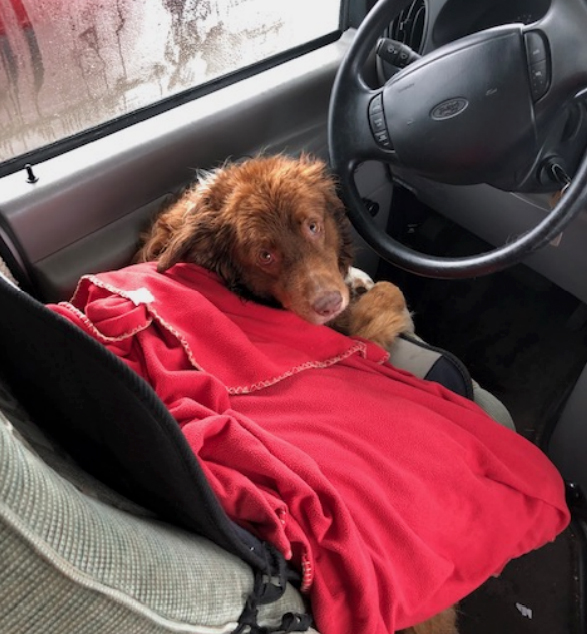
I love arriving home but I usually find getting there much less interesting than being outwardbound— as climbing a mountain is more thrilling than coming back down. Yes, indeed, when I’m outward-bound I’m fresh, bright-eyed, optimistic, looking forward to a fine adventure.
When I’m returning home the feeling is altogether different. I’ve shot my bolt— I was lonely, moldy, homesick, weary of novelty, bored with my own cooking— be it fried, boiled or canned. This wilted state of being turns me into a proper dullard — less curious, less energetic, less creative, less inclined to chat with strangers, less courageous…
So, as I say, it was time to take our leave of Pacific Beach and its charms. Accordingly, after a bit of perfunctory clean-up, Rose and I put our heads down and made a beeline for home. It took us a mere two days, and I hardly remember anything about it except the utter nuisance of having to get a PCR Covid test at Jim’s Pharmacy in Port Angeles.
However, all in all, it was a marvelous trip— just nuts. As I said in the beginning, I really didn’t care how it turned out, at least I was moving again, after two years of being without pulse or brainwave. What variety! The Coho…food poisoning…lovely Sequim…dreadful Aberdeen and its denizens…the bookmobile…Pacific Beach deluge, the Wacky Warehouse… KXPB, come on!
The word cornucopia pretty much sums it up.
Thanks for travelling with me.

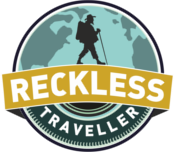
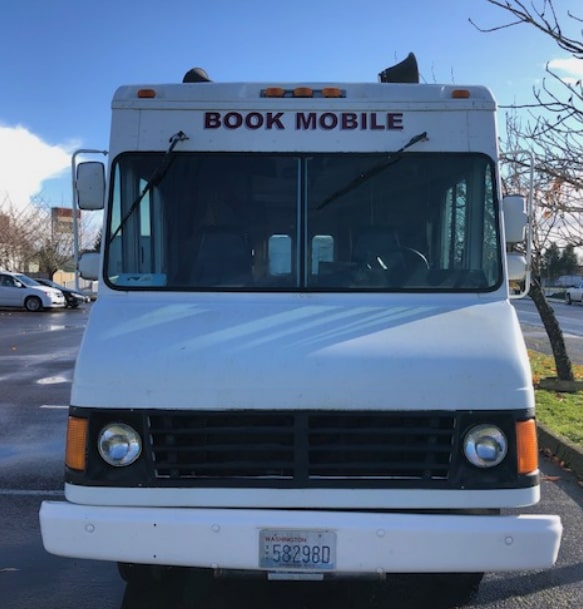
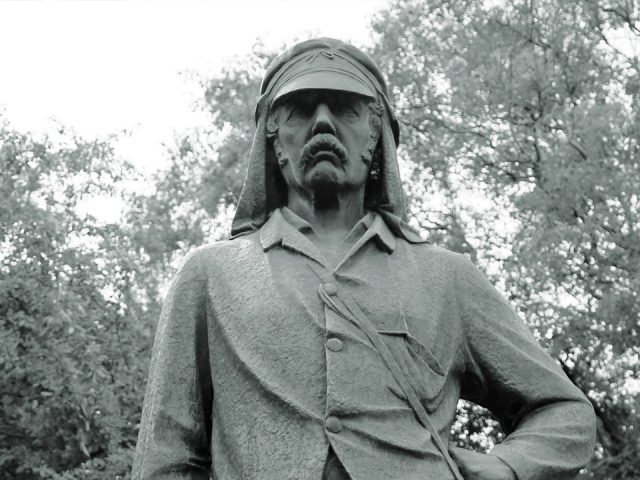
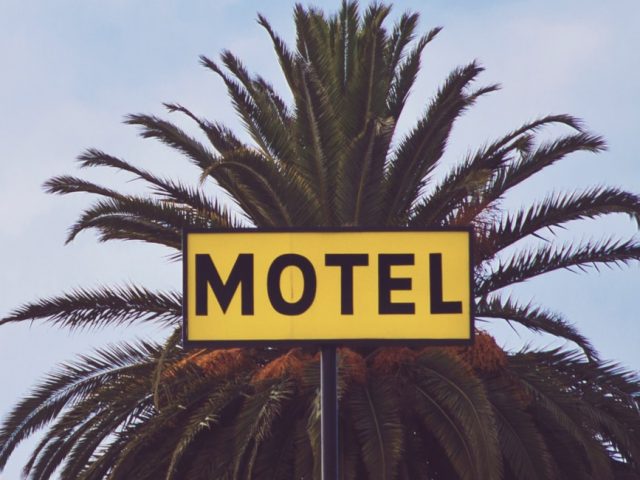

Facebook Comments